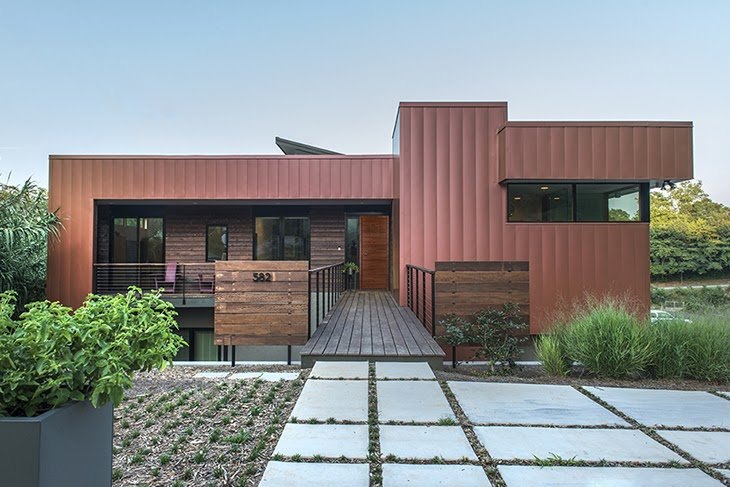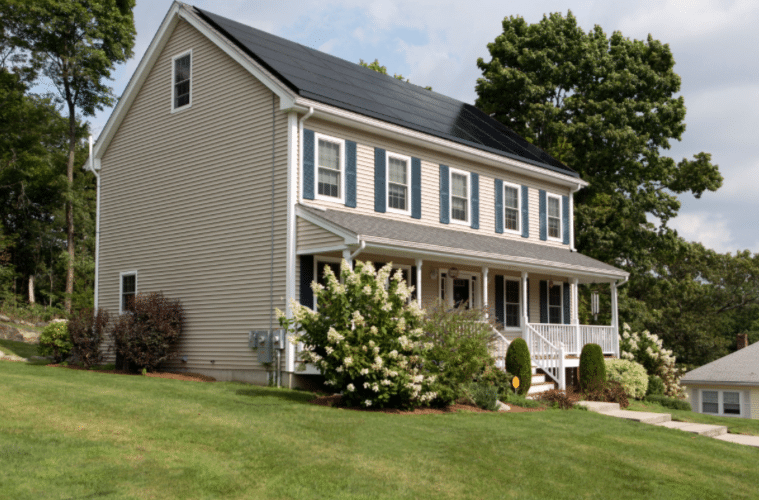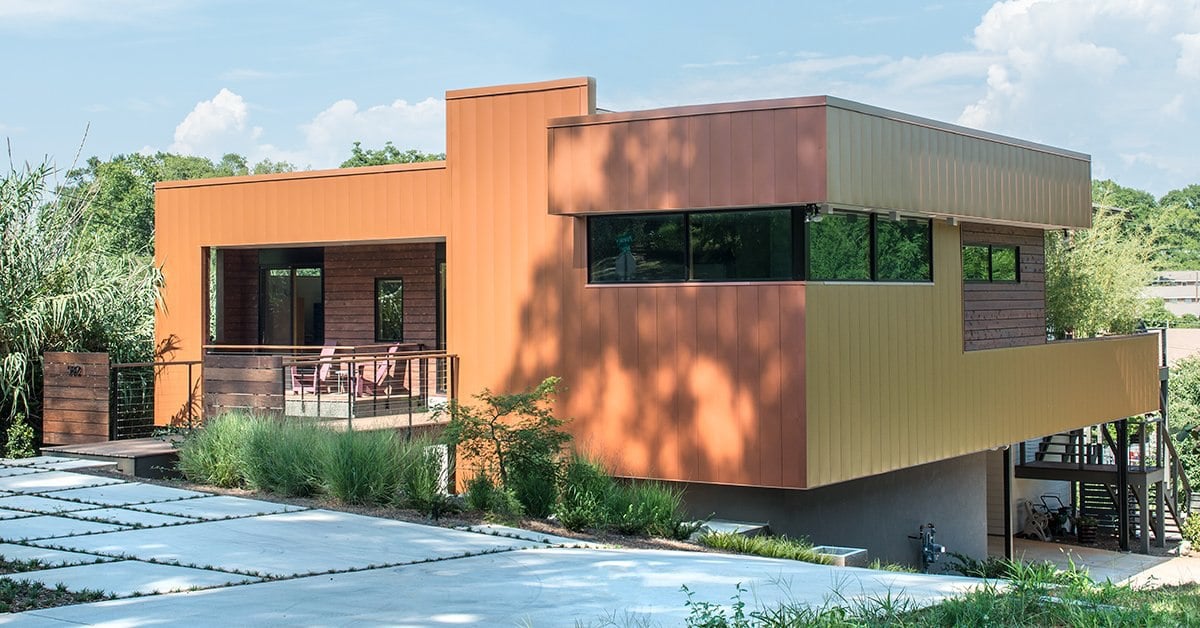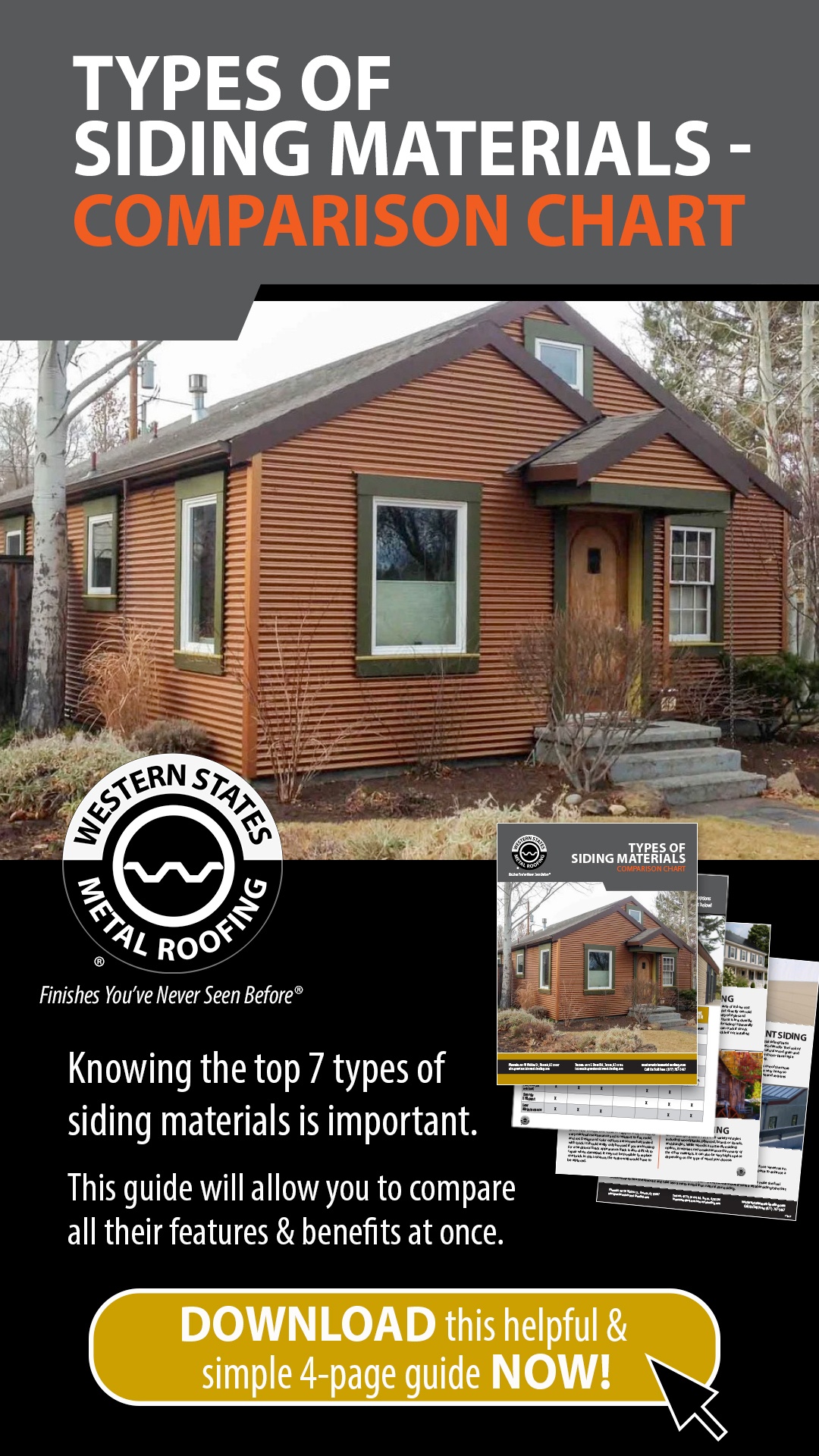Aluminum vs. Steel vs. Vinyl Siding: Which Is Better For My Home?
Picking out home siding is a big decision with a lot of choices. If you have your choices narrowed down to aluminum, steel, and vinyl siding, this article is going to help make your decision a little easier.
At Western States Metal Roofing, we manufacture metal siding panels and help homeowners pick out their new siding every day.
We don’t sell or manufacture vinyl siding, but we know that a lot of our customers consider vinyl siding due to it’s popularity. We also know that aluminum or steel is not always the right choice for everyone. What makes the right type of siding for one house is not always the same. In order for us to make sure that our clients are happy with the siding they buy from us, we want to educate all potential customers of alternative options in an honest and straightforward way.
We have taken aluminum, steel, and vinyl, three of the most popular siding choices, and compiled their biggest strengths and weaknesses so that you can determine which is the best siding for your home. This article will go, in order, and explain the pros and cons of each siding option. If you’d like to go to a specific section, you can also click one of the links below.
Pros And Cons Of Aluminum Siding
Before We Get Started: What Is The Difference Between Metal Siding, Steel Siding, And Aluminum Siding?
The phrase “metal siding” could refer to several different types of material. All of the items below are technically metals. However, in most instances when someone is referring to these types of metal siding they will be called out in a specific manner.
- Aluminum siding
- Copper siding
- Metal siding
- Steel siding
- Zinc siding
There is no difference between metal siding and steel siding. It’s an interchangeable term.
Although aluminum, copper, and zinc are a type of metal they are not typically referred to as metal siding. It would be unusual to ask for a metal siding and end up with anything other than steel. These types of siding will be referred to by name aluminum, copper, or zinc siding.
When in doubt ask what the substrate of the metal is made from.
What Are The Pros And Cons Of Aluminum Siding?
Aluminum siding is the only material we’re going to discuss that can be used in any climate. However, as a result, aluminum is also the most expensive.
What Are The Pros Of Aluminum Siding?
- Corrosion Resistant
- Energy Efficiency And Eco-Friendly
- Long Lasting
- Your Most Expensive Option
- Harder To Find
- Dents And Scratches
Corrosion Resistant
Aluminum siding is compatible with most environments. Steel siding will rust when exposed to salt-laden air in coastal regions. While vinyl siding doesn’t rust, it can crack when in very cold temperatures.
You don’t have to worry about any of these issues with aluminum as it does not rust when installed in a coastal climate.
Energy Efficient And Eco-Friendly
Aluminum is a good insulator, especially when using a heavier gauge.
It does not get as hot as steel and it cools down faster. This means your heating and cooling systems don’t have to do as much and you can see savings on your electric bill.
Aluminum siding is also environmentally friendly. It’s made from approximately 95% recycled material.
Long Lasting
Aluminum siding can last for 50 years or longer.
Aluminum shares the same benefits as other types of metal siding that contribute to its longevity including being:
- Rot Resistant
- Insect Resistant
- Mildew Resistant
- Fire Resistant
- Low Maintenance
What Are The Cons Of Aluminum Siding?
Your Most Expensive Option
The installed price for aluminum siding costs anywhere from $7.00 to $14.00 per square foot.
Aluminum is the most expensive siding option discussed in this article, usually costing about 35% more than steel siding. The range in aluminum pricing depends on factors such as the thickness, color, and style you choose.
Siding installations are never the same and the installation prices will vary depending upon the type of panel, difficulty of installation, and location of the project.
Harder To Find
While aluminum siding was actually the most common siding material in the mid 20th century, it has since gone down in popularity.
When compared to vinyl and steel siding, aluminum is a more difficult siding material to find. This can be an inconvenience, especially if you are crunched for time and need your aluminum siding material quickly.
Dents And Scratches
Aluminum is a thin soft metal and is usually half as thick as vinyl. This results in it being easier to scratch and dent. Aluminum is less resistant to damage from impact than steel and vinyl siding. One way that you can mitigate this is by using a thicker aluminum siding panel.

What Are The Pros And Cons Of Steel Siding?
Steel siding is a long-lasting material that is also generally seen as being the most durable and attractive siding option discussed in this article. However, while not as expensive as aluminum, steel still will cost more than vinyl siding. It’s a great product as long as you don’t live along the coast.
What Are The Pros Of Steel Siding?
- Long Lasting And Durable
- Low Maintenance
- Fire Resistance
- Curb Appeal
- Eco-friendly
Long Lasting And Durable
Steel siding can last 40 to 60 plus years. It’s one of the longest-lasting options you can use for home siding. If you buy metal siding with a high-quality PVDF paint system it will maintain the original look for most of its lifespan. PVDF painted products often have a 30-40 year chalk and fade warranty.
Steel is one of the strongest siding products available. This helps protect your home in case of a natural disaster. The strength of steel can withstand harsh weather elements and remain intact.
Low Maintenance
Once steel siding is properly installed, it needs a minimal amount of upkeep. An occasional washing to maintain its appearance and a quick inspection to make sure there aren’t any signs of problems with your siding is sufficient to maintain steel siding.
Fire Resistance
Steel is a non-combustible material that provides maximum protection from fires. When installed correctly metal has a Class A fire rating which is the best rating. While a fire can happen anywhere, steel siding is especially beneficial in areas that are prone to wildfires. In fact, some building codes in these areas will require a Class A fire rating.
Curb Appeal
What is considered attractive varies depending on your personal preferences, but many agree that metal siding adds curb appeal.
Steel siding gives you many different options for design. You get a large variety of different colors, profiles, and styles. This allows you to create a truly custom look to your house that stands out from your neighbors.
Steel panels can also be made in lengths that are generally longer than other types of siding. Fewer seams give you a smoother appearance on your siding panels.
Eco-Friendly
There has been a large global focus on sustainability in recent years. Steel is a construction material that is environmentally friendly. It’s made from recyclable material that can also be recycled at the end of the siding’s lifespan.
What Are The Cons Of Steel Siding?
- Higher Cost
- Climate Restrictions
- Denting
Steel Siding Has A Higher Cost
Steel is not the most expensive siding material on the market, but it’s certainly not the least expensive either. When compared to vinyl siding, the price of steel can be significantly higher.
How Much Does Steel Siding Cost?
Steel siding can cost anywhere from $5.00- $10.00 per square foot installed.
The price of steel siding will depend on the specifics of the panel you choose including:
- Gauge- The price increases as metal gets thicker.
- Panel Profile- Flush Wall concealed fastener panels are twice the price of corrugated.
- Paint System- Higher quality paint systems are more expensive.
For more information on metal siding cost, we recommend reading:
How Much Does Metal Siding Cost?
Climate Restrictions
Steel siding is not a good option for coastal properties or anywhere near the ocean. These areas have salty air from the water that results in major corrosion damage to steel siding. The siding will quickly rust if installed in a coastal climate and will have to be replaced prematurely.
Steel Siding And Denting
Steel is extremely strong and durable, but it can be scuffed, scratched, dented, or even pierced if it is struck with sufficient force or a sharp object. Sometimes it doesn’t even take an object. Simply being careless and not protecting the panels during installation can cause cosmetic damage to the siding.
Smaller dents can be easily fixed and won’t require a full replacement. However, if several panels are damaged, the entire siding would have to be replaced instead of repaired.
You can decrease the chances of denting by using a thicker steel. The thickness of steel, or gauge, plays a role in the steel’s resistance to damage. As you might expect, thicker metal has more strength and is less vulnerable to cosmetic damages.

What Are The Pros And Cons Of Vinyl Siding?
Out of the three siding materials we discuss in this article, vinyl is the most affordable and easiest to install. However, it also lasts for the shortest amount of time.
What Are The Pros Of Vinyl Siding?
- Affordability
- Ease of Installation
- Low Maintenance
Affordability
The Census Bureau’s Survey of Construction (SOC) reports that vinyl is the most commonly used type of siding. A large contributing factor to that is because vinyl is also the most affordable siding option on the market.
How Much Does Vinyl Siding Cost?
Vinyl siding costs anywhere from $3.50 to $12.00 per square foot installed. The range in price depends on if you choose insulated or non- insulated vinyl.
Traditional non-insulated vinyl ranges from $3.50- $8.00 per square foot installed.
Insulated vinyl siding ranges from $4.00 - $12.00 per square foot installed.
Insulated vinyl siding is higher in price due to being a heavier material and having a more complicated installation than non-insulated vinyl. However, it also provides energy savings that can lower your utility bills and make up for the higher upfront cost over time.
The cost difference between vinyl and steel can be minimal depending on what kind of vinyl and what gauge of steel you use. If cost is your main consideration, we recommend that you get a price on both types of siding systems. There might not be that big of a difference in price.
Ease Of Installation
A contributing factor to vinyl’s affordability is the ease of installation. With vinyl siding, you will save time and money on installation because it’s a less expensive material to install. You could even do the installation yourself.
Vinyl siding is lightweight, easy to work with, and comes with pre-drilled holes. The installation takes less time compared to steel and other siding materials.
Low Maintenance
Vinyl is similar to steel when it comes to maintenance. It is a very easy siding material that doesn’t require a lot of upkeep.
We do recommend cleaning vinyl siding to maintain its appearance and a yearly inspection to make sure there aren’t any signs of problems with your siding.
What Are The Cons Of Vinyl Siding?
- Shorter Lifespan
- Not Environmentally Friendly
- Less Curb Appeal
Shorter Lifespan
How Long Does Vinyl Siding Last?
The longevity of vinyl is not necessarily short. Vinyl siding is expected to last 20-40 years although some professionals recommend that you replace vinyl in the 10-20 year range.
However, just because something will last a long time does not mean it will look new and shiny during its entire lifespan. It depends upon your climate, but vinyl siding might actually begin to show its age and fade after only 10 to 15 years. Be sure to look at the chalk and fade section of any vinyl siding warranty to determine how long the paint will maintain its color integrity.
When compared to steel, the overall lifespan of vinyl is shorter. Steel siding can last 40-60 plus years with proper care.
The lifespan will also depend on the type of vinyl you choose. There is a wide range of quality when it comes to vinyl siding. Thin, cheap vinyl will start to crack and fade after just a few years.
Not Environmentally Friendly
Vinyl siding is made of PVC, or Polyvinyl Chloride, which releases greenhouse gases, carcinogens, and sulfur dioxide while it's being manufactured. Once installed, vinyl can release toxins that are potentially hazardous to the environment when the outside temperature gets high. It’s also not recyclable.
Less Curb Appeal
Vinyl siding has come a long way in terms of design in recent years. However, it's still discussed that some vinyl siding can look cheap, unattractive, and even potentially negatively affect your home’s value.
Vinyl tends to flatten the exterior of a home, hiding any special features such as special molding or trim. This results in a flat, two-dimensional look.
The color of vinyl also tends to fade quickly and even crack. While vinyl siding may be able to still function properly, cosmetically it may be past its prime prematurely. This leaves you with the tough decision of whether or not to pay for new siding just based on its appearance.
Deciding Between Aluminum, Steel, And Vinyl Siding
All three types of siding are popular because they are low maintenance and bring a homeowner value, just in different ways.
To help with your siding choice, we’ve summarized when it’s best to use each material.
You should consider aluminum siding when:
- You live in a coastal environment and want siding that will not rust
- You want a recyclable, eco-friendly siding material
- Cost is not a top priority
- The appearance of vinyl matches the aesthetic of your home
- Looking for the most affordable type of siding
- Doing the installation yourself
- Looking for a fast installation process
You should consider steel siding when:
- The appearance of steel matches the aesthetic of your home
- You’re looking for the longer-lasting siding material (40-60 years).
- You live in an area with a harsh climate that needs siding with maximum strength
- You want siding that is environmentally friendly
You should consider vinyl siding when:
- The appearance of vinyl matches the aesthetic of your home
- Looking for the most affordable type of siding
- Doing the installation yourself
- Looking for a fast installation process
If Metal Siding Seems Right For You, Buying Factory Direct Saves You Money
Looking to save money on your metal siding project? Western States Metal Roofing is one of the few manufacturers that sells directly to the public and to contractors. Go to the Western States Metal Roofing website to see our catalog and request a quote or metal color sample as there are hundreds of colors to choose from.
If you are interested in metal siding, learn more about the different color, profile and style options available here.
Learn more about metal siding by reading:
What Gauge Should I Use For Metal Siding







